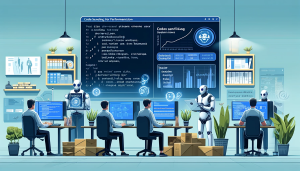 UseCasesFor.ai
UseCasesFor.ai
Choose Topic
 UseCasesFor.ai
UseCasesFor.ai
AI Use Cases
A collection of over 250 uses for artificial intelligence
A continually updated list exploring how different types of AI are used across various industries and AI disciplines,including generative AI use cases, banking AI use cases, AI use cases in healthcare, AI use cases in government, AI use cases in insurance, and more

Sign up
to receive a PDF containing all the use cases and stay updated with the latest AI trends and news (you can always unsubscribe)
Code scanning for performance

Introduction
It can be seen that the landscape of the Information Technology industry has evolved dramatically with the integration of Artificial Intelligence (AI). On of the interesting areas is the use of Generative AI or Gen AI in code scanning for performance enhancement. Code scanning is the process of using software to analyse source code for bugs and vulnerabilities and it has now become an essential part of the software development process. Due to the increasing usage of software applications, there is a rising demand for proper and efficient code scanning tools. This has resulted to the adoption of AI technologies in a bid to improve the process.
Challenges
There are however some challenges that come with the use of AI in code scanning even though it has numerous benefits. Some challenges include; the need for large data sets to train the AI, the problem of recognizing complex security defects, the problem of high false positive rate in bug detection, and the costs of implementing AI. There is also the issue of maintaining the AI model up to date with the varying coding standards and technologies as well. In addition, the deficit of qualified experts who can integrate the aspects of AI and code scanning is a major barrier.
AI Solutions
In order to meet these challenges, several AI solutions have been put forward. This is where Gen AI, a branch of AI that is meant to develop highly intelligent machines that are able to perform any task that a human being can do, has been very useful in code scanning. For example, there are companies such as DeepCode and Embold which use AI and machine learning to analyze code bases, search for patterns, and even predict bugs. It also launched an AI-assisted tool namely CodeQL where developers can formulate queries to code just like they would to a database. CodeScan, a static code analysis tool that is specific to Salesforce.com employs the use of artificial intelligence in the detection of coding problems that are detrimental to code quality and increase technical debt.
Benefits
There are a number of advantages of incorporating AI in code scanning. AI increases the efficiency of identifying vulnerabilities and at the same time decreases the time required for analyzing big code bases thus increasing the efficiency of the software development process. It also reduces the chances of mistakes that can be made by humans and helps in identifying the complex problems which can be undetectable by a human eye. In addition, the predictive nature of AI makes it possible to identify bugs before they even occur, thus improving the quality of software as well as the security of software. Lastly, with automation of the normal tasks, the developers are able to work on other complex activities thus increasing efficiency.
Return on Investment
It may be costly to implement AI for code scanning at the initial stage but the benefits that come with it in the long run are immense. With the ability that AI has in identifying code defects and bugs, the time taken in code review and debugging is reduced hence increasing the delivery of software applications to customers hence increasing customer satisfaction and revenue. Furthermore, through improving software security, AI minimises the chances of security vulnerabilities that may lead to financial losses. According to a study by the Boston Consulting Group, companies that adopt AI in their processes can enhance their returns by 38%.